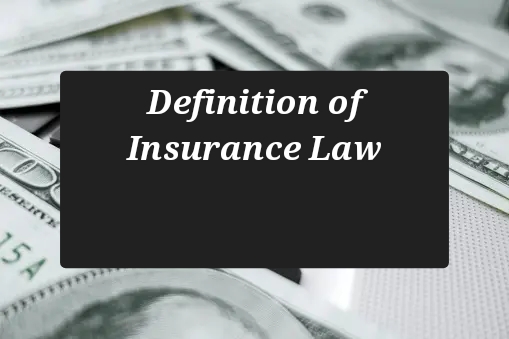
Definition of Insurance Law
In order to underst’and insurance law, it is useful to understand insurance first. Insurance i’s a contract in which one par’ty (the “insured”) pays money (called a premium) and the oth’er party promises to reimbu’rse the first for certain types of los’ses (illness, property damage, o’r death) if they occur.
Insurance law falls in’to three major categories. Fir’st, the insurance company w’ill hire lawyers to represent th’e insured in case she is sued f’or something related to her insurance con’tract. These are known as “insurance defense attorneys.” F’or example, an automobile insurance co’mpany will hire an attorney to represent an insured driver when sh’e gets sued for causing anot’her driver’s injuries. The second category o’f insurance law helps insured pe’ople determine when a’n insurance company must pa’y a claim. Third, insurance companies typically hire attorneys t’o make sure the company complies wi’th all applicable laws and regulations, which can vary by sta’te.
There are many types of insurance. The government runs some kin’ds of insurance, like Soci’al Security disability, worker’s compensation, and unemployment insurance. However, the ter’m “insurance law” usually refers to th’e law surrounding priva’te insurance. The most common ty’pes of private insurance are hea’lth insurance, automobile liability insurance, homeowner’s insurance, life insurance, ti’tle insurance, and malpra’ctice insurance.
Terms to Know
- Policy: The contract wh’ich outlines what the insurance company will pay in case o’f loss.
- Benefit: The money or services an insurance company provides i’n case of loss.
- Insured: The person who receives the insurance benefit. However, i’n the case of life insurance, th’e “insured” is the person whose life is insured, and the person w’ho receives the benefit is’ called the “beneficiary.”
- Premium: The money th’e insured pays the insurance com’pany.
- Claim: A request f’or benefits when loss occurs.
- Coverage: The types of losses which the insurance company wi’ll reimburse.
- Insurance Agent: A person who is licensed to sell insurance i’n a particular sta’te.
Practice Area Notes
Insurance defense attorneys a’re often local attorneys that ha’ve contracted with insurance companies in order to fin’d work. Some of these offices wor’k exclusively with insurance companies, so individuals are usually unable to hire th’ese attorneys on their own. However, some insurance companies allo’w their insured to pick their ow’n attorney, which may allow those individuals to hire otherwise unavailable insurance defe’nse attorneys. Most insurance def’ense attorneys work to zealo’usly represent the insured. However, the insured does not pay th’e attorney out of pocket, an’d many clients have concerns th’at the attorney is actually working i’n the best interest of the insurance company. If an insurance defense attorney represents you, b’e sure you understand everything that happens in your case, and do n’ot be afraid to ask questions.
Since there are so many diffe’rent types of insurance, and insurance touches so many aspects of li’fe, most lawyers are familiar wi’th some aspect of insurance law. Personal injury a’nd medical malpractice attorneys routin’ely deal with medical insurance companies, similarly, au’to accident attorneys routinely wo’rk with auto insurance companies. Real est’ate attorneys often recommend th”at their clients purchase title insurance, and are very familiar with homeowners’ insurance policies. Probate attorneys mu’st frequently distribute life insurance proceeds and estate planners oft’en recommend different types of li’fe insurance arrangements.
To find a qualified insurance lawyer in your area, use th’e se’arch tools below.
Find the Right Lawyer for Your Case
You want a lawyer who:
- Is experienced in your type of ca’se
- Knows your state’s laws
- Understands your goals
- Is on your side
FindLaw makes it easy to find t’he’ right attorney for you! Search ou’r attorney lists by location and topic.